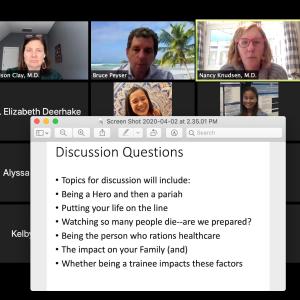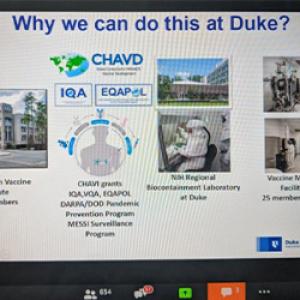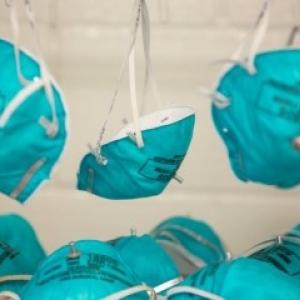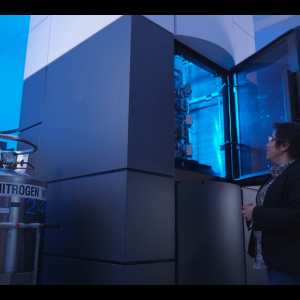Medical Education in a Time of COVID-19
The arrival and rapid spread of COVID-19 in mid-March disrupted virtually all normal operations at Duke. Administrators, faculty, students, and staff had to move quickly to revise plans, adapt procedures, move operations, and improvise on the fly.
School of Medicine hosts virtual COVID-19 research day to facilitate quick faculty collaboration during pandemic
More than 700 faculty, staff and students tuned into the Duke University School of Medicine’s first COVID-19 Research Forum, held virtually on Friday, April 17, 2020.
The goal of the event was to highlight important work, share knowledge, discuss opportunities and encourage partnerships and collaboration among researchers.
Why do some people infected with coronavirus fare worse than others? School of Medicine researchers search for answers
When infected with SARS-CoV-2, why do some people—such as smokers and older adults— have extreme respiratory and cardiovascular distress while others have no symptoms at all?
A multi-disciplinary Duke team including a virologist, pulmonologist, and a pediatrician are working to answer this question by studying a surface molecule found on the thin layer of epithelial tissue that lines the lungs, heart and most other organs in the body.
DCRI-Led Registry Launches, Invites Healthcare Workers Nationwide to Fight COVID-19 Together
The HERO registry, which can be joined at HeroesResearch.org, will enroll thousands of healthcare workers to answer crucial questions about the impact of novel coronavirus on their lives.
The Duke Clinical Research Institute (DCRI)-led Healthcare Worker Exposure Response & Outcomes (HERO) Registry launched today, inviting U.S. healthcare workers to share clinical and life experiences in order to understand the perspectives and problems faced by those on the COVID-19 pandemic front lines.
Children and COVID-19
A curious feature of the new coronavirus is that it rarely causes severe symptoms in children. Some other respiratory viruses, such as influenza and respiratory syncytial virus (RSV), are especially dangerous for both the very old and the very young. But this new virus, which can be lethal in the elderly, spares the vast majority of young children.
At first it seemed that few children were getting infected with the new virus, but that view has changed as more is learned about the pathogen.
Duke on the Forefront of COVID-19 Research
Researchers and staff at the Duke Human Vaccine Institute and the Duke Regional Biocontainment Laboratory are working around the clock to develop therapies and a vaccine to combat COVID-19.
COVID-19 researchers are critical personnel in the fight against this virus. Safe, urgent and collaborative work in the Duke Human Vaccine Institute with collaborators in and outside Duke to develop a countermeasure and vaccine. Thank you! - Mary E. Klotman, MD, Dean, Duke University School of Medicine
Duke Clinical Research Institute to Expedite Study of COVID-19 Prevention in Healthcare Workers
The Patient-Centered Outcomes Research Institute has funded up to $50 million to evaluate hydroxychloroquine as a preventive drug for the novel coronavirus.
A new rapid-response study designed and led by the Duke Clinical Research Institute (DCRI) seeks to engage healthcare workers across the nation to understand the impact of COVID-19 on their health and to evaluate whether hydroxychloroquine can prevent COVID-19 infections in healthcare workers at high risk of contracting this novel coronavirus.
Duke Starts Novel Decontamination of N95 Masks to Help Relieve Shortages
The process uses vaporized hydrogen peroxide to kill germs without degrading the masks
Facing a critical shortage of N95 face masks that block the coronavirus, Duke Health research and clinical teams have confirmed a way to use existing vaporized hydrogen peroxide methods to decontaminate the masks so they can be reused.
Duke leverages cryo-electron microscope facility in the race for coronavirus vaccine
Although most research laboratories at Duke University are shuttered to prevent future transmission of the Covid-19 coronavirus, one of the few to remain open houses a powerful machine that Duke researchers think will be instrumental in developing a vaccine for the virus.
Duke joins first national effort to test a potential COVID-19 therapy
Adults with severe symptoms of the novel illness will have the opportunity to participate
Duke University Hospital has joined the first national study to test a potential therapy for COVID-19, giving hospitalized adult patients with significant symptoms an option to participate.
The investigational treatment, known as remdesivir, is an antiviral agent that was previously tested in humans with Ebola virus disease and has shown promise in animal studies against MERS and SARS, diseases that emerged from different strains of the coronavirus.








